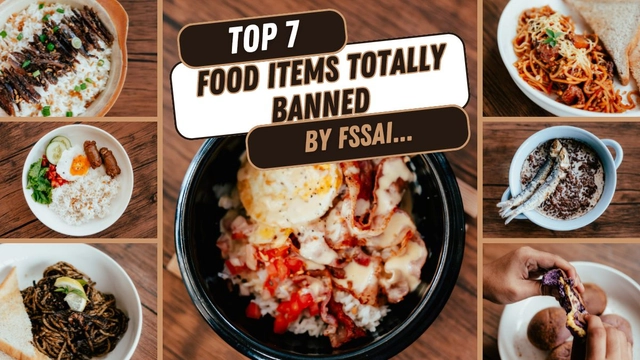- By Priyanka Munshi
- Wed, 12 Jun 2024 05:14 PM (IST)
- Source:JND
The Food Safety and Standards Authority of India (FSSAI) recently banned a number of items just to protect the public's health and safety. This decision was made following a thorough assessment of the health concerns associated with these products, some of which contain high concentrations of dangerous compounds or ingredients not recommended for consumption. The goal of the ban is to shield consumers from potential health risks such as chronic illnesses, foodborne infections, and other conditions.
By removing these hazardous foods from the market, the FSSAI aims to raise public awareness of healthy eating practices and enhance the overall quality of food. This action underscores the importance of regulatory oversight in upholding food safety standards and protecting public health. Below is a complete list of items that are completely banned by FSSAI in India.

The move also raises public awareness of healthy eating practices and emphasizes the importance of regulatory oversight in upholding food safety standards.(Image Credit:Canva)
Sassafras Oil
Sassafras oil was outlawed by the FSSAI in 2003 because of its high erucic acid concentration, which raises the risk of heart disease and other ailments, thereby safeguarding consumers' cardiovascular health.
Chinese Garlic
In 2019, the FSSAI banned Chinese garlic shipments into India due to concerns over elevated pesticide residue levels. The prohibition emphasized the necessity of stringent legislation and quality control methods to safeguard public health and enforce food safety laws.
Also Read: Do You Know About These Amazing Advantages Of Walking Lunges?
Brominated Vegetable Oil (BVO)
Citrus-flavored drinks contain brominated vegetable oil (BVO), which is banned or used sparingly in more than 100 countries due to health concerns, including thyroid and neurological symptoms.
Rabbit Meat
Rabbit meat is prohibited in India due to religious sensitivity and animal welfare issues. Hindus refrain from consuming rabbit meat to support a more humane approach to food production and to align with Indian cultural values of compassion and respect for all living creatures.
-1718192620934.jpg)
The goal of the ban is to shield consumers from potential health risks such as chronic illnesses, foodborne infections, and other conditions.(Image Credit:Canva)
Genetically Modified Foods (GM Foods)
India limits the imports and production of genetically modified foods due to concerns about the environment, biodiversity, and human health. While commercial cultivation is allowed, there are stringent approval procedures.
Also Read: Travel Lightly: 5 Things Which You Should Not Keep In Your Bag While Travelling
Potassium Bromate
A food component used to boost bread volume and dough flexibility, potassium bromate, was outlawed by the FSSAI in 2016 because of potential cancer risks, including thyroid cancer. According to the International Agency for Research on Cancer, it may also cause cancer.
Chinese Milk And Milk Products
Chinese milk and milk products were prohibited by the Food Safety and Standards Authority of India (FSSAI) in 2008 due to contamination concerns and food safety crises in China, such as the melamine milk incident that claimed numerous lives.
(Disclaimer: This article is for informational purposes only. It is not a substitute for professional advice, diagnosis or treatment.)

